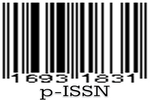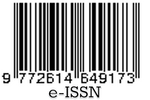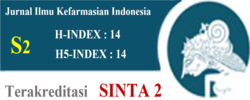The Analysis of Knowledge, Adherence, and Clinical Outcome of Hypertensive Patients in Puskesmas Jetis Yogyakarta
Abstract
Hypertension has been an increasing global epidemic problem over years and considered as one of the deadly disease with a high cardiovascular complication risk. Knowledge and adherence play an important role in patient's clinical impact, which determined the level of medication’s adherence. Thus, adherence level determines the achievement of clinical outcome. The optimum clinical optimum will be achieved if the adherence level is at good level. The method in this study was using observational analytics with a cross sectional approach. The sampling method was consecutive sampling. The subjects were the adult hypertensive patients at Puskesmas Jetis Kota from August until October 2020. Univariate analysis was conducted in patient’s and medication characteristics. Kendal Tau test was used to analyze the relationship between adherence and clinical outcome. 81 hypertensive patients were included in this study. The highest prevalence of patient’s characteristics were shown on the women’s group: 45-59 years old, senior high school education background, and no occupation. Amlodipine was the highest medication used as a single therapy. It was found that there is no relationship between knowledge and adherence level. In addition to that, there was no relationship between adherence level and clinical outcome measured by systole and diastole.
References
2. Indonesian Ministry of Health. Main result of basic health research. 2018. Available from: https://www. litbang.kemkes.go.id/hasil-utama-riskesdas-2018/
3. Jokisalo E, Kumpusalo E, Enlund H, Takala J. Patients’ perceived problems with hypertension and attitudes towards medical treatment. J Hum Hypertens. 2001;15(11):755–61. Available from: https://www. nature.com/articles/1001276
4. Szczęch R, Szyndler A, Wizner B, Narkiewicz K. Education of patients with hypertension [w:] In: Januszewicz A, Januszewicz W, Szczepańska- Sadowska E, Sznajderman M, editors. Arterial Hypertension. Kraków: Medycyna Praktyczna; 2007:1225–1230.
5. Oliveria SA, Chen RS, McCarthy BD, Davis CC, Hill MN. Hypertension knowledge, awareness, and attitudes in a hypertensive population. J Gen Intern Med. 2005;20(3):219–25. Available from: https://www. ncbi.nlm.nih.gov/pmc/articles/PMC1490067/
6. Vrijens B, Vincze G, Kristanto P, Urquhart J, Burnier M. Adherence to prescribed antihypertensive drug treatments: Longitudinal study of electronically compiled dosing histories. Bmj. 2008;336(7653):1114– 7. Available from: https://www.ncbi.nlm.nih.gov/ pubmed/18480115/
7. Burnier M, Egan BM. Compendium on the Pathophysiology and Treatment of Hypertension Adherence in
Hypertension. 2019;1124–40.
8. Subhan A. Relationship between Knowledge and Attitude about Hypertension with Average Blood Pressure of Patients in the Internal Medicine Polyclinic of the Muhammadiyah Palembang Hospital. Muhammadiyah Palembang; 2013.
9. Jaeynisha M, Gde Ngurah Indraguna Pinatih. Overview of the Level of Knowledge of Hypertension and Adherence to Taking Medication in Patients with Hypertension in the Kintamani I Health Center Working Area. Intisari Sains Medis. 2017;8(3):176–80. Available from: https://doi.org/10.15562/ism.v8i3.121
10. Rizki A. Effect of Knowledge on Compliance of Hypertension Patients in the Outpatient Installation of Dr.Moewardi Surakarta Hospital February-April 2018 Period. Muhammadiyah Surakarta; 2018.
11. Ernawati I, Fandinata SS, Permatasari SN. The Effect of Hypertension Knowledge Level on Adherence to Drug Consumption of Hypertension Patients in Several Health Centers in Surabaya. Sci J Farm dan Kesehatan 2021;11(1):42.
12. Jankowska-Polańska B, Uchmanowicz I, Dudek K, Mazur G. Relationship between patients’ knowledge and medication adherence among patients with hypertension. Patient Prefer Adherence. 2016;10:2437– 47.
13. Nadia H, Murti AT, Chairun W. The Effect of Pharmacist Counseling on Adherence to Drug Use and Therapy Outcomes of Diabetes Mellitus Patients at the Puskesmas. 5th Urecol Proceeding. 2017;(February):1–8.
14. Riani DA, Ikawati Z, Kristina SA. validation of the 8-Item Morisky Medication Adherence Scale Indonesian Version in Adult Hypertension Patients at Puskesmas Sleman Regency and Yogyakarta City. Repos UGM. 2017;xiii–xiv. Available from: http://etd. repository.ugm.ac.id/index.php?mod=penelitian_det ail&sub=PenelitianDetail&act=view&typ=html&bu ku_id=109818&obyek_id=4
15. Maulidina F, Harmani N, Suraya I. Factors Associated with the Incidence of Hypertension in the Jati Luhur Bekasi Health Center Working Area 2018. ARKESMAS (Arsip Kesehatan Masyarakat). 2019;4(1):149–55.
16. Indrawan A. Relationship between Income, Education, and Physical Activity of Patients with the Incidence of Hypertension. Universitas Sebelas Maret; 2014.
17. Pratiwi OM, Wibisana AA. The Relationship between Diet and the Incidence of Hypertension Disease in the Elderly in Blokseger Hamlet, Tegalsari District, Banyuwangi Regency. Ikesma. 2018;14(2):77. Available from: https://doi.org/10.19184/ikesma. v14i2.10458
18. Harahap RA, Rochadi RK, Sarumpae S. The Effect of Physical Activity on the Incidence of Hypertension in Early Adult Males (18-40 Years) in the Bromo Medan Health Center Area in 2017. J Muara Sains, Teknologi Kedokteran dan Ilmu Kesehatan. 2018;1(2):68–73. Available from: https://doi.org/10.24912/jmstkik. v1i2.951
19. Umbas IM, Tuda J, Numansyah M. Relationship between Smoking and Hypertension in Kawangkoan Health Center. J Nursing. 2019;7(1). Available from: https://doi.org/10.35790/jkp.v7i1.24334
20. Salem H, Hasan DM, Eameash A, El-Mageed HA, Hasan S, Ali R. Worldwide Prevalence of Hypertension: a Pooled Meta-Analysis of 1670 Studies in 71 Countries With 29.5 Million Participants. J Am Coll Cardiol. 2018;71(11):A1819. Available from: http://dx.doi.org/10.1016/S0735-1097(18)32360-X
21. Dennison-himmelfarb C, Handler J, Lackland DT. 2014 Evidence-Based Guideline for the Management of High Blood Pressure in Adults Report From the Panel Members Appointed to the Eighth Joint National Committee (JNC 8). 2014;1097:1–14.
22. Jeffers BW, Robbins J, Bhambri R, Wajsbrot D. A Systematic Review on the Efficacy of Amlodipine in the Treatment of Patients with Hypertension with Concomitant Diabetes Mellitus and/or Renal Dysfunction, When Compared with Other Classes of Antihypertensive Medication. Am J Ther. 2015;22(5):322–41.
23. Fitri T, Sihombing H, Artini IGA. Level of knowledge about hypertension. 2017;6.
24. Rizki A. The Effect of Knowledge on Compliance of Hypertension Patients in the Outpatient Installation of Dr.Moewardi Surakarta Hospital February-April 2018 Period. Muhammadiyah Surakarta; 2018.
25. Wibowo MINA, Setiawan D, Ikhwaniati ND, Sukma FA. The Effect of Counseling and Treatment Reminder Tool to Adherence with Drug and Outcome Clinic Patients with Diabetes Mellitus and Hypertension. J Ilmu Kefarmasian Indonesia. 2020;18(2):169–76. Available from: https://doi.org/10.35814/jifi.v18i2
26. Nurul M, Mila R. The Relationship Between Adherence to Drug Use and Therapeutic Success in Hypertension Patients at Surakarta Regional Hospital in 2010. Pharmacon. 2010;11(2):51–6. Available from: https:// doi.org/10.23917/pharmacon.v11i2.55
27. Khomaini A, Setiati S, Lydia A, Dewiasty E. Effect of Structured Education and Adherence to Taking Antihypertensive Medication on Decreasing Blood Pressure in Elderly Hypertensive Patients: A Double-blind Randomized Clinical Trial. J Penyakit Dalam Indonesia. 2017;4(1):4. Available from: https://doi. org/10.7454/jpdi.v4i1.106
28. Chusna N, Sari IP, Probosuseno. The Effect of Adherence and Treatment Patterns on the Outcomes of Hypertension Patients. J Manaj and Service Farm. 2014;2946. Available from: https://doi.org/10.22146/ jmpf.292
29. Anwar, K., & Masnina, R. (2019). The Relationship between Adherence to Taking Antihypertensive Medication with Blood Pressure in Elderly Patients with Hypertension in the Working Area of the Air Putih Samarinda Health Center. Borneo Student Research, 1568, 494–501.

This work is licensed under a Creative Commons Attribution-NonCommercial-ShareAlike 4.0 International License.
Licencing
All articles in Jurnal Ilmu Kefarmasian Indonesia are an open-access article, distributed under the terms of the Creative Commons Attribution-NonCommercial-ShareAlike 4.0 International License which permits unrestricted non-commercial used, distribution and reproduction in any medium.
This licence applies to Author(s) and Public Reader means that the users mays :
- SHARE:
copy and redistribute the article in any medium or format - ADAPT:
remix, transform, and build upon the article (eg.: to produce a new research work and, possibly, a new publication) - ALIKE:
If you remix, transform, or build upon the article, you must distribute your contributions under the same license as the original. - NO ADDITIONAL RESTRICTIONS:
You may not apply legal terms or technological measures that legally restrict others from doing anything the license permits.
It does however mean that when you use it you must:
- ATTRIBUTION: You must give appropriate credit to both the Author(s) and the journal, provide a link to the license, and indicate if changes were made. You may do so in any reasonable manner, but not in any way that suggests the licensor endorses you or your use.
You may not:
- NONCOMMERCIAL: You may not use the article for commercial purposes.
This work is licensed under a Creative Commons Attribution-NonCommercial-ShareAlike 4.0 International License.





 Tools
Tools





















